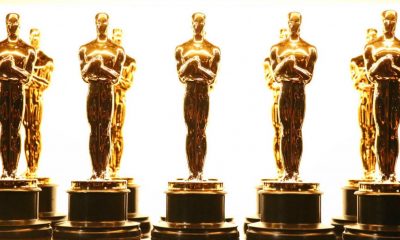Arts & Entertainment
Ellen DeGeneres under fire for supporting Kevin Hart
The talk show host says the comedian has ‘grown’ and ‘apologized’
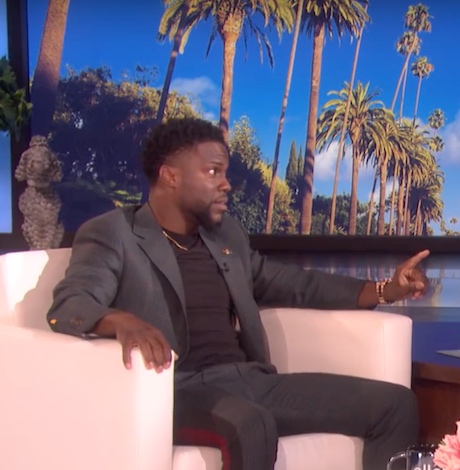
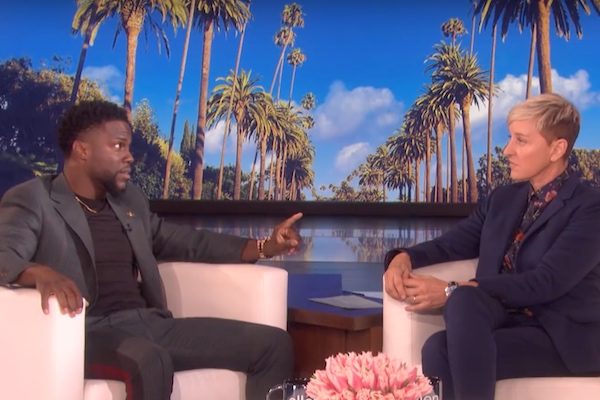
Ellen DeGeneres is facing backlash for supporting Kevin Hart and actively campaigning to have Hart host the Oscars.
Hart was tapped to host this year’s Oscars but stepped down after old homophobic jokes and tweets resurfaced. DeGeneres invited Hart on “The Ellen DeGeneres Show” to talk about the fall out with the episode scheduled to air on Monday. However, DeGeneres and
In the interview, Hart explains that he has repeatedly apologized for the jokes, which were made 10 years ago, and viewed the situation as an attack on his character and an attempt to ruin his career. DeGeneres let Hart know that she fully supports him and even called the Academy on his behalf.
“I called them, I said, ‘Kevin’s on, I have no idea if he wants to come back and host, but what are your thoughts?’ And they were like, ‘Oh my God, we want him to host! We feel like that maybe he misunderstood or it was handled wrong. Maybe we said the wrong thing but we want him to host. Whatever we can do we would be thrilled. And he should host the Oscars,'” DeGeneres says.
She continued to explain that she thinks Hart has learned from his mistakes and deserves to come back as host.
“As a gay person, I am sensitive to all of that. You’ve already expressed that it’s not being educated on the subject, not realizing how dangerous those words are, not realizing how many kids are killed for being gay or beaten up every day,” DeGeneres says. “You have grown, you have apologized, you are apologizing again right now. You’ve done it. Don’t let those people win — host the Oscars.”
I believe in forgiveness. I believe in second chances. And I believe in @KevinHart4real. pic.twitter.com/oJxfGXhU4P
— Ellen DeGeneres (@TheEllenShow) January 4, 2019
Some people criticized DeGeneres for labeling people who took issue with the jokes “haters” and “trolls.” There were also people who didn’t believe Hart was being genuine with his apology.
(1) First, the people who brought up Kevin Hart’s past tweets — like me — were not, as Ellen characterized, “haters.” The host of the Oscars had made anti-gay jokes, and LGBT people who love the Oscars were legitimately startled to see just how harsh his words were. It wasn’t a…
— Adam B. Vary (@adambvary) January 4, 2019
The only thing @KevinHart4real proved by going on Ellen was that he is a terrible actor with zero genuine remorse who didn’t have the decency to address his ignorance. No, they weren’t “haters” who came after you. It was the LGBTQI+ community because we’re sick to shit of it.
— Harry Cook (@HarryCook) January 4, 2019
I also believe in forgiveness. But I also believe that forgiveness requires an actual apology. Not “I’m sorry people are so sensitive.” Just “I am sorry.” All he had to do. And he indignantly refused because he felt his moment was being tainted. That he was the aggrieved.
— Eamon Paton-Usry (@Eamon2Please) January 4, 2019
this whole ellen/kevin hart thing is a perfect example of how privilege and constant praise distorts a person’s reality so much that they perceive any criticism, however valid, to be an attack on their entire livelihood
— ellie (@eleanorbate) January 4, 2019
I feel like if you’re not homophobic anymore, you shouldn’t mind apologizing for your past homophobia again and again and again. I don’t want to hear a hostile retelling of how we didn’t hear your meager apology the first time.
— Louis Virtel (@louisvirtel) January 4, 2019
DeGeneres appeared to notice the backlash as she tweeted, “However you feel about this, the only positive way through it is to talk about it. Thank you for being here, @KevinHart4real. “
Out & About
Queer, trans AAPI joy shone at this year’s Golden Dragon Parade
In this photo essay, the Blade documents resilience and queer euphoria at Saturday’s Lunar New Year festivities.
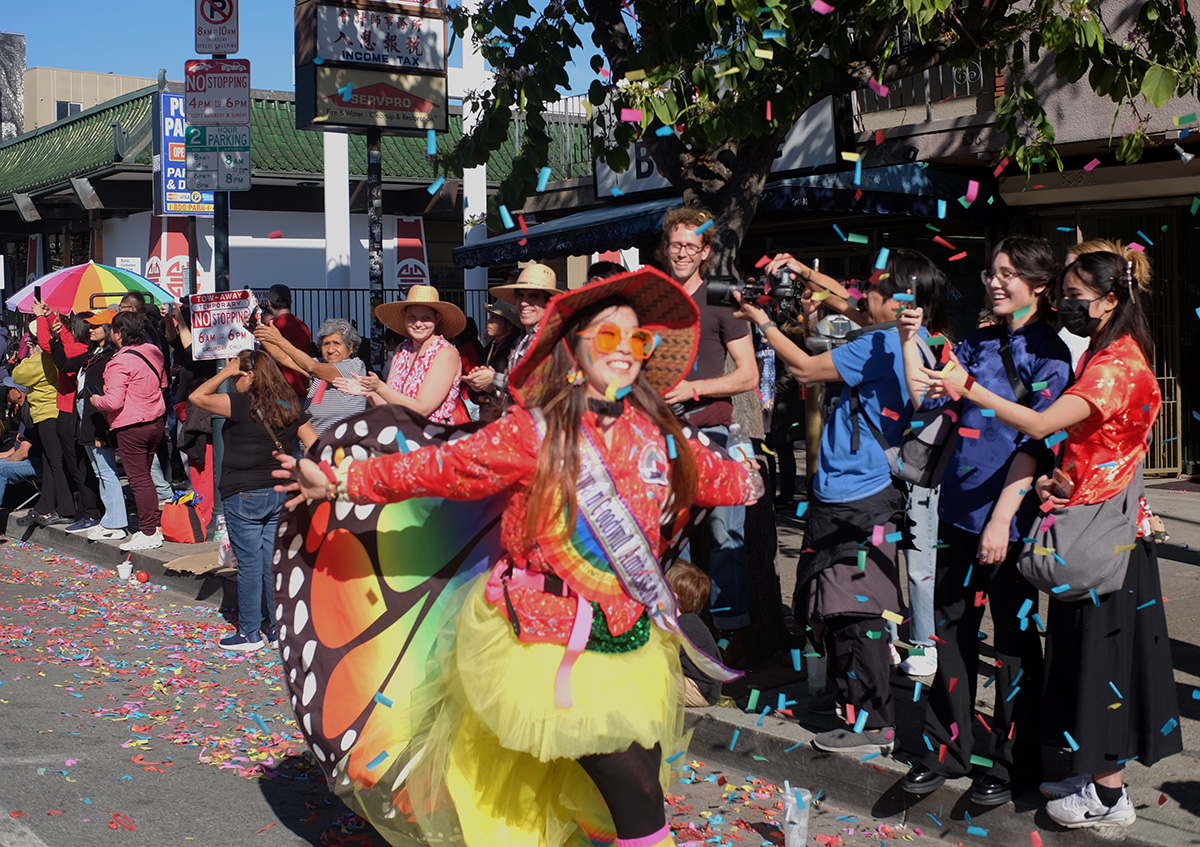
On Saturday afternoon, under a hot, beating sun, I marched at the annual Golden Dragon Parade in L.A.’s Chinatown with members of the API Rainbow Coalition: a network of organizations that protects, centers, and uplifts the safety and joy of queer and trans Asian American and Pacific Islander (QTAPI) people.
Composed of groups like Asian Americans Advancing Justice Southern California (AJSOCAL), Okaeri, Access to Prevention Advocacy Intervention and Treatment (APAIT), and PFLAG San Gabriel Valley / API, the coalition has shown up for two decades to greet the parade’s spectators with warm wishes for the new year, and to combat anti-LGBTQ+ fear and hate with boundless joy and togetherness.
For myself and many others present on Saturday, it was our first time marching in the parade. It was our first time standing definitively, amidst thousands of people, as proud queer QTAPI people. Will Zhang, who was one of six people holding up a beautiful silk dragon that bore the pink and blue shades of the Trans Pride Flag rather than the symbol’s traditional red and yellow hues, said that being with the community at events like these felt like he could finally “unmask.” He felt able to embody his full self.
For the first time back in my Southern Californian roots, I felt truly liberated. Adrenaline pulsed through my limbs, shocking me alive with a boldness I had never experienced as a closeted kid growing up in the San Gabriel Valley. At the parade, I cheered and jumped, waved at strangers with an elation that extended from deep within my body and then flew beyond me.
That uninhibited, childlike wonder that first trickled out, broke like a dam: a flooding of joy that was made possible only because I felt so safe and embraced alongside allies, both new and old, who continue to nurture a path of liberation for ourselves and for future generations.
There is hostility abound, but gathering allows us to rebel and become stronger. “Goodness prevails,” Zhang said, as we continued to march ahead.
All image captures by Kristie Song.
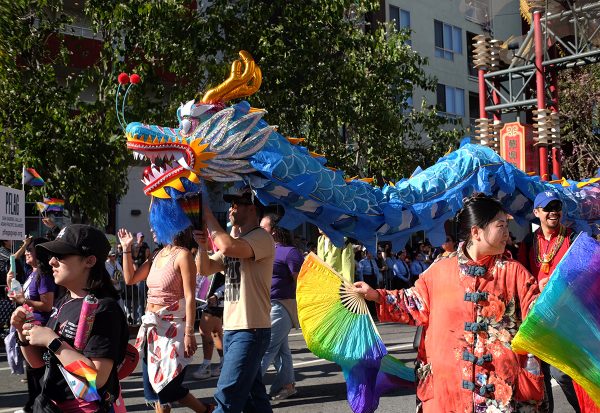
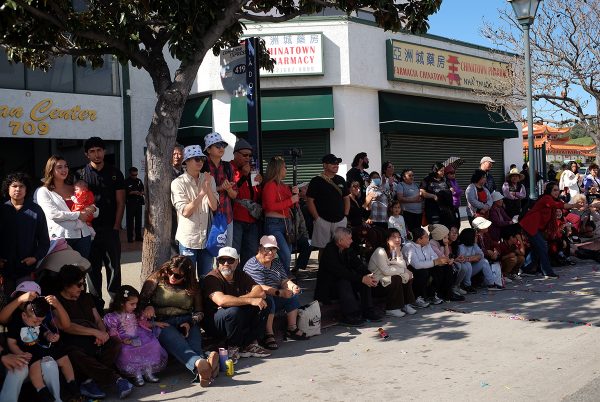
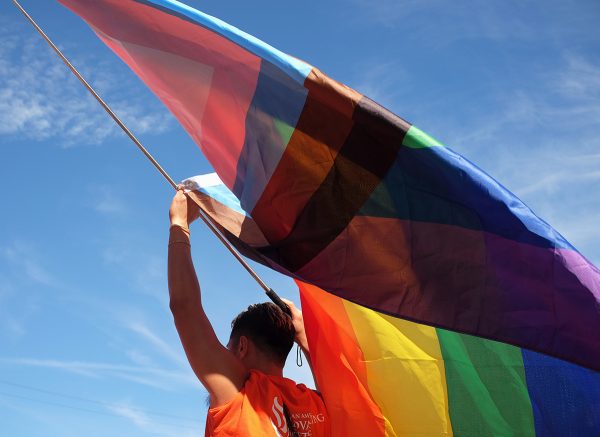
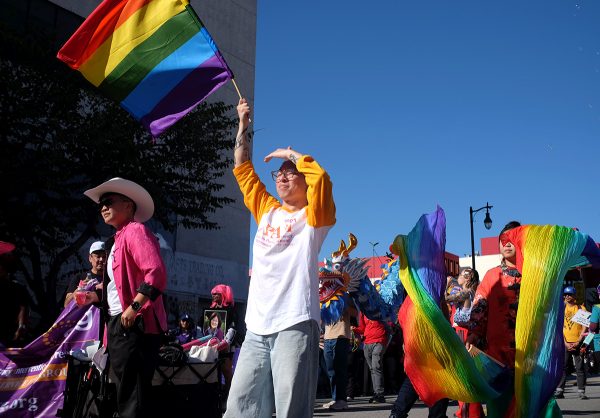
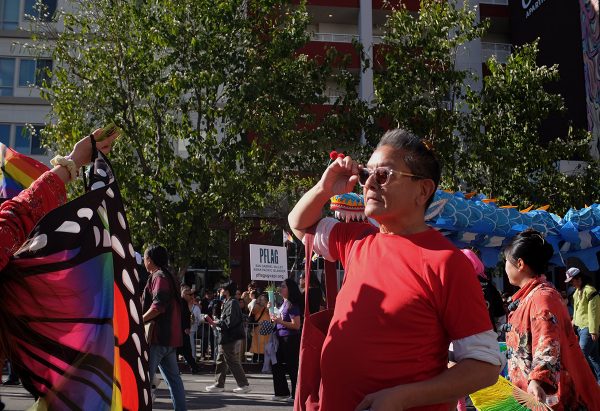
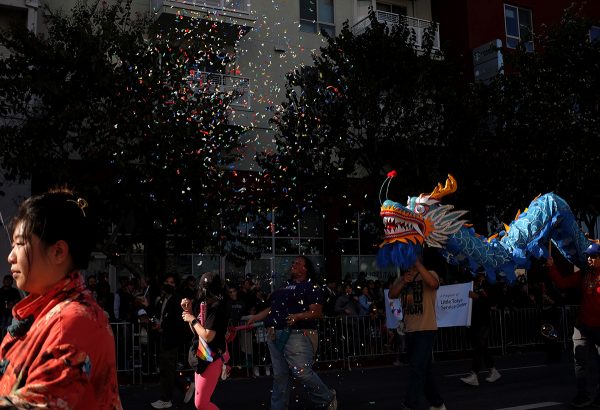
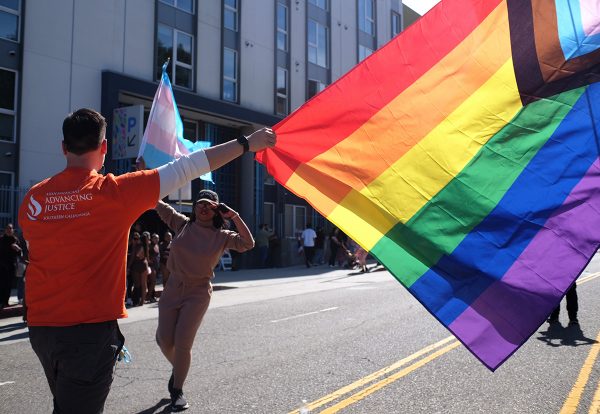
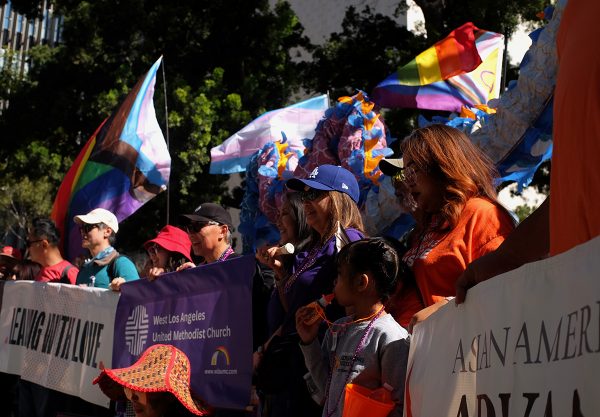
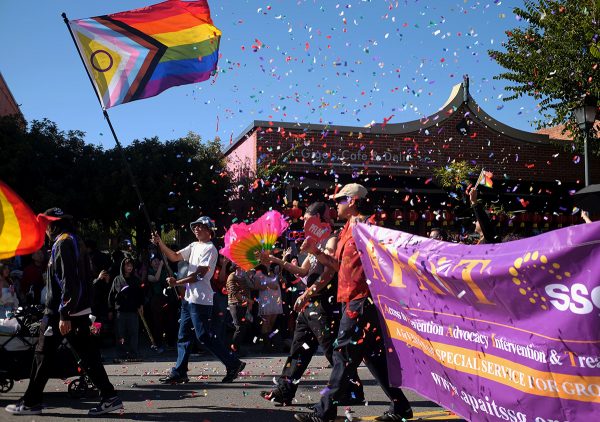
Kristie Song is a California Local News Fellow placed with the Los Angeles Blade. The California Local News Fellowship is a state-funded initiative to support and strengthen local news reporting. Learn more about it at fellowships.journalism.berkeley.edu/cafellows.
Movies
Radical reframing highlights the ‘Wuthering’ highs and lows of a classic
Emerald Fennell’s cinematic vision elicits strong reactions

If you’re a fan of “Wuthering Heights” — Emily Brontë’s oft-filmed 1847 novel about a doomed romance on the Yorkshire moors — it’s a given you’re going to have opinions about any new adaptation that comes along, but in the case of filmmaker Emerald Fennell’s new cinematic vision of this venerable classic, they’re probably going to be strong ones.
It’s nothing new, really. Brontë’s book has elicited controversy since its first publication, when it sparked outrage among Victorian readers over its tragic tale of thwarted lovers locked into an obsessive quest for revenge against each other, and has continued to shock generations of readers with its depictions of emotional cruelty and violent abuse, its dysfunctional relationships, and its grim portrait of a deeply-embedded class structure which perpetuates misery at every level of the social hierarchy.
It’s no wonder, then, that Fennell’s adaptation — a true “fangirl” appreciation project distinguished by the radical sensibilities which the third-time director brings to the mix — has become a flash point for social commentators whose main exposure to the tale has been flavored by decades of watered-down, romanticized “reinventions,” almost all of which omit large portions of the novel to selectively shape what’s left into a period tearjerker about star-crossed love, often distancing themselves from the raw emotional core of the story by adhering to generic tropes of “gothic romance” and rarely doing justice to the complexity of its characters — or, for that matter, its author’s deeper intentions.
Fennell’s version doesn’t exactly break that pattern; she, too, elides much of the novel’s sprawling plot to focus on the twisted entanglement between Catherine Earnshaw (Margot Robbie), daughter of the now-impoverished master of the titular estate (Martin Clunes), and Heathcliff (Jacob Elordi), a lowborn child of unknown background origin that has been “adopted” by her father as a servant in the household. Both subjected to the whims of the elder Earnshaw’s violent temper, they form a bond of mutual support in childhood which evolves, as they come of age, into something more; yet regardless of her feelings for him, Cathy — whose future status and security are at risk — chooses to marry Edgar Linton (Shazad Latif), the financially secure new owner of a neighboring estate. Heathcliff, devastated by her betrayal, leaves for parts unknown, only to return a few years later with a mysteriously-obtained fortune. Imposing himself into Cathy’s comfortable-but-joyless matrimony, he rekindles their now-forbidden passion and they become entwined in a torrid affair — even as he openly courts Linton’s naive ward Isabella (Alison Oliver) and plots to destroy the entire household from within. One might almost say that these two are the poster couple for the phrase “it’s complicated.” and it’s probably needless to say things don’t go well for anybody involved.
While there is more than enough material in “Wuthering Heights” that might easily be labeled as “problematic” in our contemporary judgments — like the fact that it’s a love story between two childhood friends, essentially raised as siblings, which becomes codependent and poisons every other relationship in their lives — the controversy over Fennell’s version has coalesced less around the content than her casting choices. When the project was announced, she drew criticism over the decision to cast Robbie (who also produced the film) opposite the younger Elordi. In the end, the casting works — though the age gap might be mildly distracting for some, both actors deliver superb performances, and the chemistry they exude soon renders it irrelevant.
Another controversy, however, is less easily dispelled. Though we never learn his true ethnic background, Brontë’s original text describes Heathcliff as having the appearance of “a dark-skinned gipsy” with “black fire” in his eyes; the character has typically been played by distinctly “Anglo” men, and consequently, many modern observers have expressed disappointment (and in some cases, full-blown outrage) over Fennel’s choice to use Elordi instead of putting an actor of color for the part, especially given the contemporary filter which she clearly chose for her interpretation for the novel.
In fact, it’s that modernized perspective — a view of history informed by social criticism, economic politics, feminist insight, and a sexual candor that would have shocked the prim Victorian readers of Brontë’s novel — that turns Fennell’s visually striking adaptation into more than just a comfortably romanticized period costume drama. From her very opening scene — a public hanging in the village where the death throes of the dangling body elicit lurid glee from the eagerly-gathered crowd — she makes it oppressively clear that the 18th-century was not a pleasant time to live; the brutality of the era is a primal force in her vision of the story, from the harrowing abuse that forges its lovers’ codependent bond, to the rigidly maintained class structure that compels even those in the higher echelons — especially women — into a kind of slavery to the system, to the inequities that fuel disloyalty among the vulnerable simply to preserve their own tenuous place in the hierarchy. It’s a battle for survival, if not of the fittest then of the most ruthless.
At the same time, she applies a distinctly 21st-century attitude of “sex-positivity” to evoke the appeal of carnality, not just for its own sake but as a taste of freedom; she even uses it to reframe Heathcliff’s cruel torment of Isabella by implying a consensual dom/sub relationship between them, offering a fragment of agency to a character typically relegated to the role of victim. Most crucially, of course, it permits Fennell to openly depict the sexuality of Cathy and Heathcliff as an experience of transgressive joy — albeit a tormented one — made perhaps even more irresistible (for them and for us) by the sense of rebellion that comes along with it.
Finally, while this “Wuthering Heights” may not have been the one to finally allow Heathcliff’s ambiguous racial identity to come to the forefront, Fennell does employ some “color-blind” casting — Latif is mixed-race (white and Pakistani) and Hong Chau, understated but profound in the crucial role of Nelly, Cathy’s longtime “paid companion,” is of Vietnamese descent — to illuminate the added pressures of being an “other” in a world weighted in favor of sameness.
Does all this contemporary hindsight into the fabric of Brontë’s epic novel make for a quintessential “Wuthering Heights?” Even allowing that such a thing were possible, probably not. While it presents a stylishly crafted and thrillingly cinematic take on this complex classic, richly enhanced by a superb and adventurous cast, it’s not likely to satisfy anyone looking for a faithful rendition, nor does it reveal a new angle from which the “romance” at its center looks anything other than toxic — indeed, it almost fetishizes the dysfunction. Even without the thorny debate around Heathcliff’s racial identity, there’s plenty here to prompt purists and revisionists alike to find fault with Fennell’s approach.
Yet for those looking for a new window into to this perennial classic, and who are comfortable with the radical flourish for which Fennell is already known, it’s an engrossing and intellectually stimulating exploration of this iconic story in a way that exchanges comfortable familiarity for unpredictable chaos — and for cinema fans, that’s more than enough reason to give “Wuthering Heights” a chance.
a&e features
‘Pee-wee as Himself’ and ‘Lurker’ directors on how queer audiences have reacted to their Spirit Award-winning films
“It’s been revelatory for young people,” Matt Wolf said of telling Paul Reubens’ coming out story

This year’s Film Independent Spirit Awards winners told wide-ranging stories of everything from Paul Reubens’ posthumous coming out in Pee-wee as Himself to a fictional homoerotic relationship that forms between an artist and his biggest fan in Lurker.
With such a diverse group of winners, these filmmakers reflected on how queer people and young audiences have responded to their work.
“I’ve talked to people whose kids have seen the film, and young kids don’t understand what the closet is,” Pee-wee as Himself director Matt Wolf told The Blade backstage. “As a younger, gay filmmaker, I felt like I could help him do that on his own terms. It was a big deal for Paul. It’s interesting to hear from people’s kids who don’t understand the struggle.”
Wolf continued: “It’s been revelatory for young people in that sense, but also I’m hearing from people that their kids are now watching Pee-wee’s Playhouse, and that they love it. And you never know, does this thing look old? Does it feel outdated? [His films are] so otherworldly, and I don’t think young people register it as being from any time.”
Lurker director Alex Russell (who previously wrote on Beef and The Bear) nabbed awards for best first screenplay and best first feature, and Théodore Pellerin and Archie Madekwe were nominated for their performances. Russell’s win is a testament to Film Independent’s legacy of embracing new generations of filmmakers and storytellers.
While accepting the award for best first screenplay, Russell recognized the creatives who took a chance on him, saying: “I want to thank everyone who was willing to look stupid and put even just a sliver of themselves on the line to legitimize all these new filmmakers here tonight, who, without you, would still be aspiring to make their first movie.”
Backstage, The Blade asked the breakthrough filmmaker about how queer people have responded to the film’s thorny take on male relationships.
“I don’t know if the queer community has reacted to me personally. There’s an interesting discussion in what Matthew and Olivier’s relationship is all about … and where they stand on the spectrum,” Russell said. “I want people to think about that, I want people to think about the ambiguity of that. That being said, if the queer community wants to talk to me about it, I’m here!”
Pee-wee as Himself is available to stream on HBO Max, while Lurker is on MUBI.
a&e features
Liveplay series ‘Gladlands’ finds hope in the unlikeliest of places
The cast of ‘Dimension 20’s’ latest season discusses bringing chaos and community to their many loyal fans.
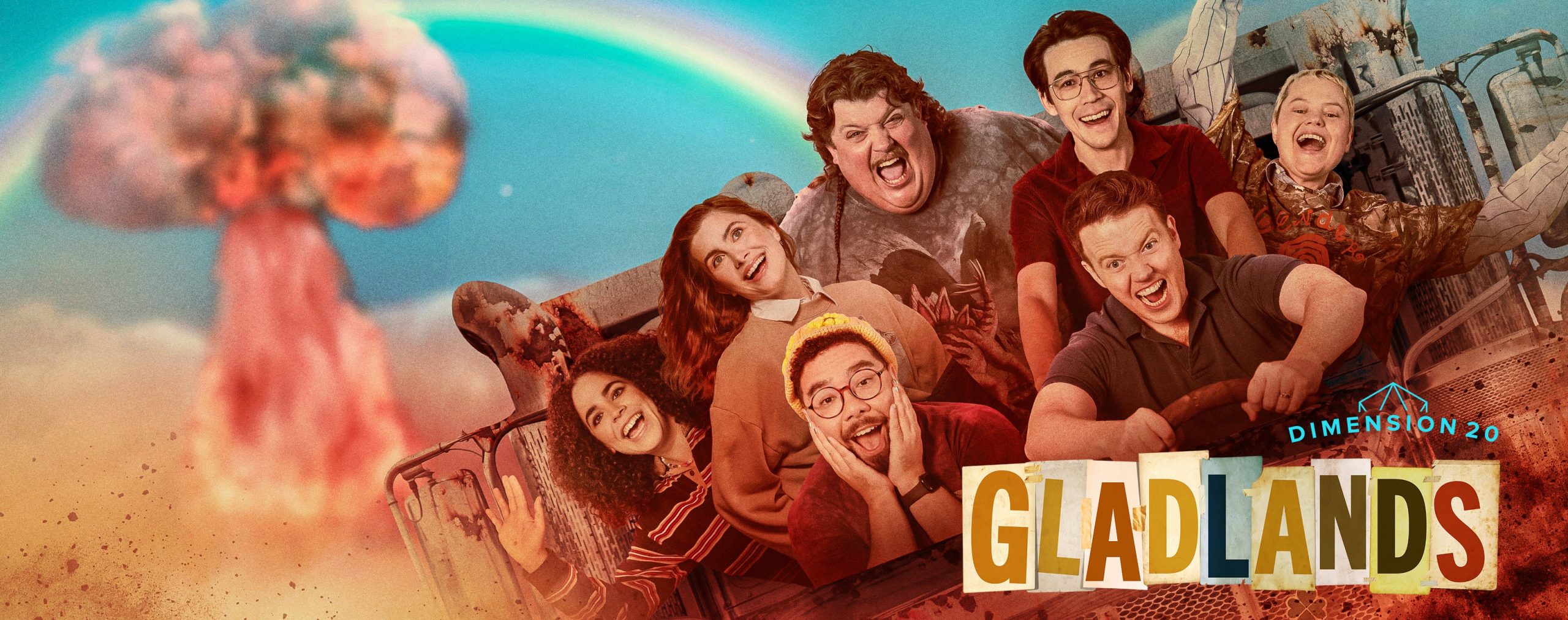
Sometimes, it takes everything falling apart for us to remember that community is what holds us together.
It’s a lesson that many people have learned in recent months. Amidst the ongoing attacks against LGBTQ+ and immigrant populations, folks across the country have come to realize just how important community is to each of our daily lives.
Now more than ever, marginalized communities need to remember that oppressors have always used grief to further disenfranchise the people they’re attacking. And that, as laughable as it seems at times, the best response to others’ hatred is to love one another; to foster strength and joy amongst our own groups to ensure we have the fortitude necessary in the ongoing fight against bigotry. Many projects have tried to remind folks of this message…and one just so happens to be a tabletop roleplaying game (TTRPG) set in a post-apocalyptic — and so, so queer — wasteland.
Gladlands is the latest season of Dimension 20, a renowned TTRPG liveplay series that sees groups of LA-based performers tackle some chaotic new narrative every season. The show’s newest installment takes place in a barren wasteland, with all cities and symbols of civilization reduced to rubble after a multi-year ecological crisis (which just so happens to resemble the one we’re currently fighting right now). The cast, which features a majority LGBTQ+ group of LA-based comedians, plays a team of folks trying to help as many people in this hellscape as possible, reminding every survivor they come across that it’s easiest to get through the hard times when we’re in them together.
The cast of Gladlands sat down with the LA Blade to discuss this poignant message and how it feels to deliver it when folks need it most. They speak about their roles in the series, their personal lives as local artists in Los Angeles, and how it’s fun pieces of media like this that can get folks through the toughest times. They raved about this complex project and what they hope it will bring to everyone who watches, with each player emphasizing Gladlands’ core message: you are not alone.
As strange as it may seem to people not in the community, it’s not uncommon for role-playing games like Gladlands to touch on issues real people struggle with every day. “It really is transformative,” said Oscar Montoya, who plays the fierce Drag Queen librarian ‘Poppy Persona’ on the season. “There’s a little bit of your soul that goes into every character that you play…and there’s so much self-realization that comes when you play TTRPG that you [may not] even recognize!” It’s a sentiment that fellow player Kimia Behpoornia, who plays the skateboarding cockroach-human hybrid ‘Tess Tube5,’ echoed, stating, “[These games] help people feel so validated.”
The cast reiterated how it’s these sessions of fantasy that often allow people to grow in very real ways. That’s why they believed it was the perfect platform to spread the message of love threaded throughout Gladlands, a season that sees their group of apocalyptic advocates — members of the legendary ‘Carer-Van’ — drive across an endless desert in search of anyone who needs help. An eclectic group of humans and mutants, each episode sees them work hard to see the good in their fellow person and flex their many skills to assist those in need.
“It’s really nice that this season is here [during a time] when it really resonates,” Kimia went on. “But it’s kind of the simplest idea [ever] to want to help your community!” Vic Michaelis, whose plague mask-wearing character ‘Hugi’ is the apocalypse’s only mortician, stressed that the show’s message is one that everyone needs to remember right now. “We’re living during a time [when] community is very important…but there’s no way [when we were filming] that we would’ve known the season would come out at a time like this. But [we are] watching people dig down right now and go, ‘We are taking care of our community.’” They reminded everyone watching that this kind of communal care is not only inspiring, but also threatening, saying, “That strikes fear amongst people in power. There is success in coming together to protect your community, [which I think] reflects the themes of Gladlands.”
“Trying to stay glad is, in itself, a form of resistance,” Agreed Jacob Wysocki, who portrays the warm and cuddly caretaker KoKoMo. He detailed how, through their characters, each player hoped to offer viewers models of the many behaviors that allow real communities to flourish. On that in particular, he gave credit to the season’s dungeon master, Brennan Lee Mulligan, saying, “He built this world because he looked at the [real] world we’re in and [asked], ‘Does it take a fully post-apocalyptic world to get to a space where community [comes] first?’”
“Baby — we live in the post-apocalyptic times right now!” Said Montoya, whose time as a Los Angeles activist has given him special insight into how this city’s communities have been struggling. “[But] I think the important thing to realize is that we create our own Gladlands…the message of community coming together to combat adversity is so paramount, especially right now. To have a collection of people you can lean on and say, ‘We don’t like this. We don’t stand for this. Let’s create something together.”
Each cast member agreed that, while a lovely sentiment, the messages broadcast through their show are easier said than done. But they each emphasized that you don’t need to be part of a roving band of super-powered caretakers to do good — and that no matter what, this kind of work should never be done in solitude. “[Remember] you’re not in it alone,” emphasized Montoya, as the interviews came to an end. “You are a part of a community that can enact change. And know: they’re trying to take that away from us. They’re trying to make us feel smaller and less than. [But] you have to recognize that we have the power…especially when it feels so overwhelming. Because it is then that you have people who have your back, who will continue to have your back [no matter what].”
An uplifting message of community, wrapped up in a chaotic season of jaw-dropping dice rolls and truly wild character arcs. Gladlands showcases that, sometimes, the most important lessons come in the most surprising packages. And, with each of these performers at the helm, it highlights the core message of this series as a whole: you’re never alone in the fight for community. And true freedom starts with being there for your neighbors, making sure that you all have what you need for whatever may come next.
a&e features
Tello Films: Celebrating 19 years of lesbian storytelling
Tello Films proves that, after 19 years, independent lesbian filmmaking is as necessary as ever.
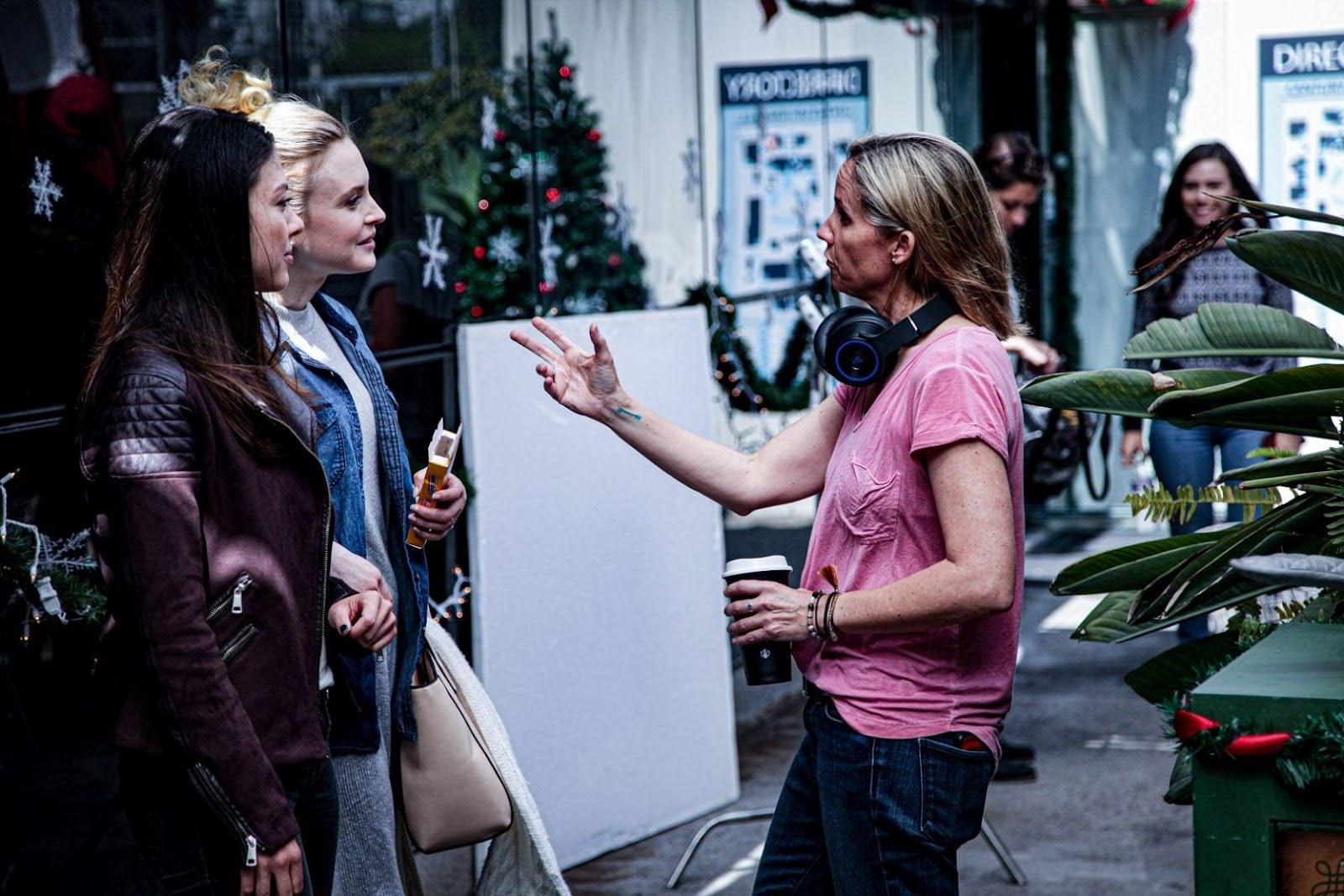
In an era where LGBTQ representation in movies has hit a three-year low, Tello Films proves that, after 19 years, independent lesbian filmmaking is as necessary as ever. According to Sarah Kate Ellis, the CEO and President of GLAAD, “Nearly ⅓ of non-LGBTQ Americans say that LGBTQ inclusive films have changed their perception of our community… It is imperative that networks and streamers do not back down.”
Meanwhile, the lesbian streaming service Tello Films celebrated its 19th birthday on February 6th. Says founder Christin Baker, “When I started it 19 years ago, I thought at some point maybe we wouldn’t be necessary, […] I really do feel like representation saves lives…it’s still important for us to be around.” Often referred to as the “Lesbian Netflix”, the Nashville-based production company has a primary focus on lesbian and sapphic stories for the past 19 years and thankfully, is just getting started.
Tello Films was far ahead of its time. For those of you who didn’t live through or don’t remember, 2007 was a different time. Apple debuted the first iPhone, Barack Obama declared his run for the presidency, and the phrase “that’s so gay!” was prevalent as ever (at least at my high school). “We didn’t have marriage equality at that time. Civil unions were kind of starting here and there -the crazy thing (is that) ‘Don’t Ask Don’t Tell’ was still in effect.” Baker recalls, “There were still so many rights we didn’t have in 2007 when we started it, and we are still fighting for it.”
Tello Films’ beginnings were just the start of the lesbian legacy. Said Christin, “I never thought Tello would or could ever be my full-time job.” With the URL TelloFilms.com registered on February 6, 2007, the platform was an internet-based streaming company with all its movies formatted small to appease a 2007-era browser. While Netflix was only just beginning to offer streaming services, launching any streaming service in 2007 was bold; to launch a streaming service entirely devoted to lesbian and sapphic stories was revolutionary. “I want to make lesbian stories.. I want to see things that represent me.”
In the past 19 years, Baker shares her career-defining moment came from the recently deceased Nancylee Myatt, showrunner for South of Nowhere. “We made a short-form series called Cowgirl Up. I felt like I put my big girl pants on. Nancylee was a huge mentor, and I was like, ‘Oh, I can do this. I can do this, and I can figure it out.’”
Tello went on to receive their first primetime Emmy nomination with Mindy Sterling of Austin Powers fame for Outstanding Actress in a Short Form Comedy or Drama Series. “We got two daytime Emmy nominations for two actresses, Liz Vassey and Carolyn Radere […], then in 2018 we made our first lesbian Christmas movie,, Season of Love and that really kind of started us down the path, and I think we’re probably most well known for, which is our lesbian holiday rom-coms.”
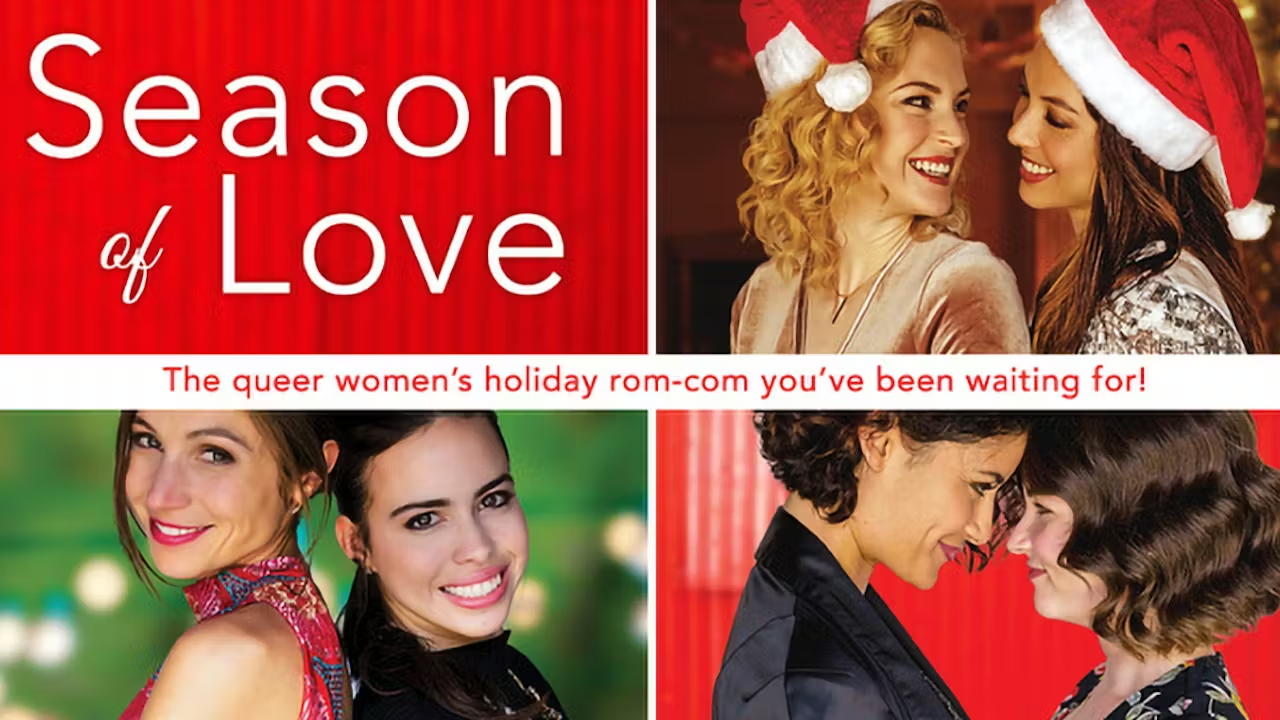
We now live in the era of Chappell Roan, Doechii, Heated Rivalry, and so many more queer artists and pieces of media in the mainstream’s consciousness. The last several years in pop culture have proven that queer art and artists matter, not just as a salve to a society that still struggles to accept us, but to the mass audiences who continue to resonate with it.
Queer media is being devoured by folks outside of the LGBTQ community. “I think it (Heated Rivalry) shocked so many people (because) it was powerful and compelling […] I wasn’t that surprised because I remember Brokeback Mountain being very much in that same vein; it was just cowboys instead of hockey players.” Authenticity and overcoming adversity are not just tenets of good storytelling; they are also ever-present themes within the lives of any queer you know.
As Christin sees it, the success of Heated Rivalry isn’t just rooted in its unabashed sexual themes, it has a very universal “lesbian” approach to its storytelling “There’s a ton of longing, and missing, and having a crush and not knowing if it’s reciprocated, […] there’s a lot that you tap into just on a human level that Heated Rivalry really touched on.”
Themes that are at the forefront of the sapphic stories Tello has mastered telling. “We still don’t have enough LGBTQ holiday Christmas movies out there each year. Some people wouldn’t look at a Hallmark movie or Christmas rom-com as substantive, but I really do feel like representation saves lives.”
For so many in the LGBTQ community, representation isn’t theoretical- it’s personal. I know for myself, in the throes of a messy divorce, one of the only things that brought me comfort was the sapphic films on Tello. It was so difficult to find lighthearted queer stories. I recall searching through every streaming service as they were slowly but surely eliminating the LGBTQ sections from their apps, as well as those queer characters and shows. But not Tello; I was able to find comfort and ease through a tough time in my personal life. “It’s such comfort, especially if you’ve gone through something that’s tough and your regular daily life is stressful, you need an escape to something that you know is not going to cause more anxiety.”
Having accessible ways to both tell and consume sapphic stories is tantamount to this moment in time. Independent filmmaking has the power to make sure authentic stories are heard. Being an independent voice as well as being able to support smaller budget stories that definitely wouldn’t get picked up, or even recognized or seen in mainstream, Christin and Tello Films are uplifting not just lesbian and sapphic stories, but lesbian and sapphic artists as well.
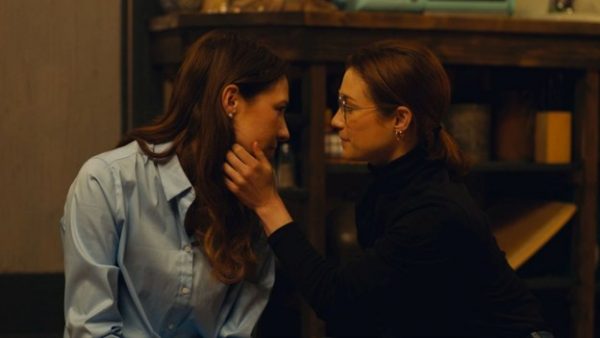
As for the future of lesbian filmmaking, it’s no secret that Hollywood is drowning, leaving a void for people like Christin and Tello Films to fill. Said Baker in light of the shrinkage in Hollywood and what that means for Tello Films, “We will get even more creative and tell even more stories, because we can’t be stopped.”
Encouraged by her fiancée, Stacey Lee Powell, Christin wants the world to know that Tello Films isn’t just a business, it’s personal. “I see Tello as an extension of me.” Says Baker, “In doing that, I hope that people see that Tello isn’t some corporate entity, I hope they see that it is someone who cares deeply. I’ve been doing this for 19 years, and every day I wake up trying to figure out how to tell our stories and how to serve our community.” Nineteen years later, Tello Films remains what it has always been: not a nameless, faceless corporation, but an extension of a storyteller’s dream to build a safe space for her community.
Check out TelloFilms.com
Movies
Eva Victor winning best screenplay, Erin Doherty winning supporting actress, and more queer highlights of the 2026 Film Independent Spirit Awards
‘Sorry, Baby’ and ‘Lurker’ were among the big winners
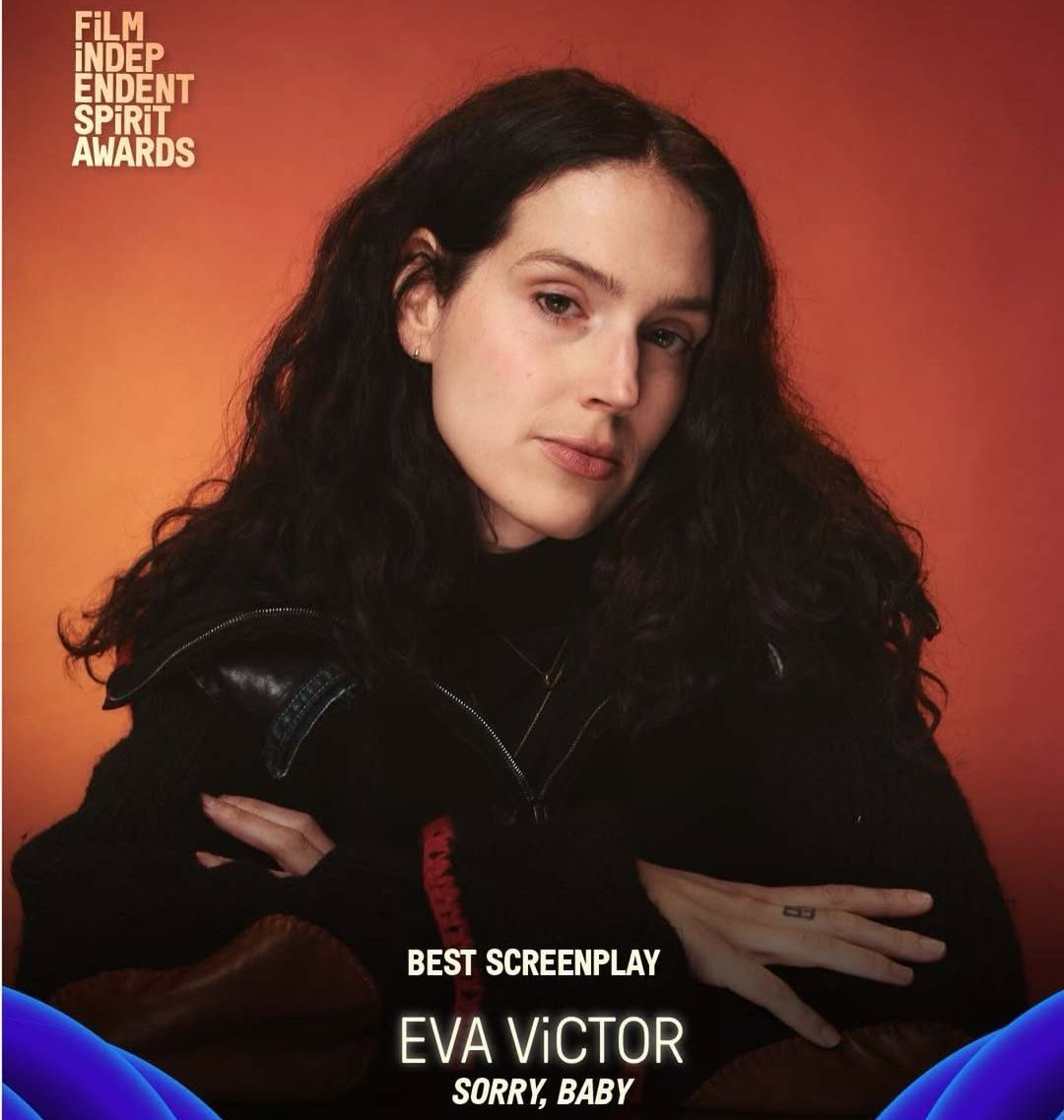
Sorry, Baby, Train Dreams, and Lurker were the big winners of this year’s Film Independent Spirit Awards.
The Spirit Awards were held Sunday, Feb. 15, at the Hollywood Palladium in Los Angeles, California, with stars Eva Victor, Rose Byrne, Keke Palmer, Tessa Thompson, Amy Madigan, Erin Doherty, and Dylan O’Brien in attendance.
Train Dreams won best feature and best director, Victor won the best screenplay prize for Sorry, Baby. Pee-wee as Himself won the award for best new non-scripted or documentary series, and Doherty continued her awards season sweep for Adolescence with a win for best supporting performance in a new scripted series.
While accepting an award for writing Sorry, Baby, Victor said: “Making this film independently is the only way I could have ever made it the way I wanted to. I’m so, so grateful for independent cinema, and I love everyone here for that.”
Where the Oscars largely ignored the best queer indie hits, the Spirit Awards became this year’s go-to awards show for under-the-radar favorites. Sorry, Baby, Twinless, Peter Hujar’s Day, and Lurker all scored best feature nominations, while Ira Sachs (you can read The Blade’s interview here) was nominated for best director. Notably, all four of those films premiered at Sundance.
In the lead performance film category, Tessa Thompson (you can read The Blade’s interview here), Ben Whishaw, Théodore Pellerin, and Dylan O’Brien were all nominated, while Oscar nominee Rose Byrne took home the top honor. Twinless may have gone home empty-handed, but the film was a huge point of conversation throughout the award ceremony.
Beyond the films they recognize, what makes the Spirit Awards different from more mainstream award shows is the lack of gender specific categories; the Oscars traditionally have separate categories for male and female performers.
The Gotham Awards went gender-neutral in 2021, and the Spirit Awards followed during its 2023 ceremony. “We think the ways we’ve created equity through our award show is not only a reflection of the world we live in, but representative of the industry and what we want it to look like,” Film Independent acting president Brenda Robinson told me in an interview for Variety in May 2025.
Books
Zoë Rose Bryant on her chart-topping debut novel ‘Good Friends’ and inspiring young trans people online
‘Good Friends’ is currently #1 on Amazon’s “Hot New Releases” list of LGBTQ+ romance books
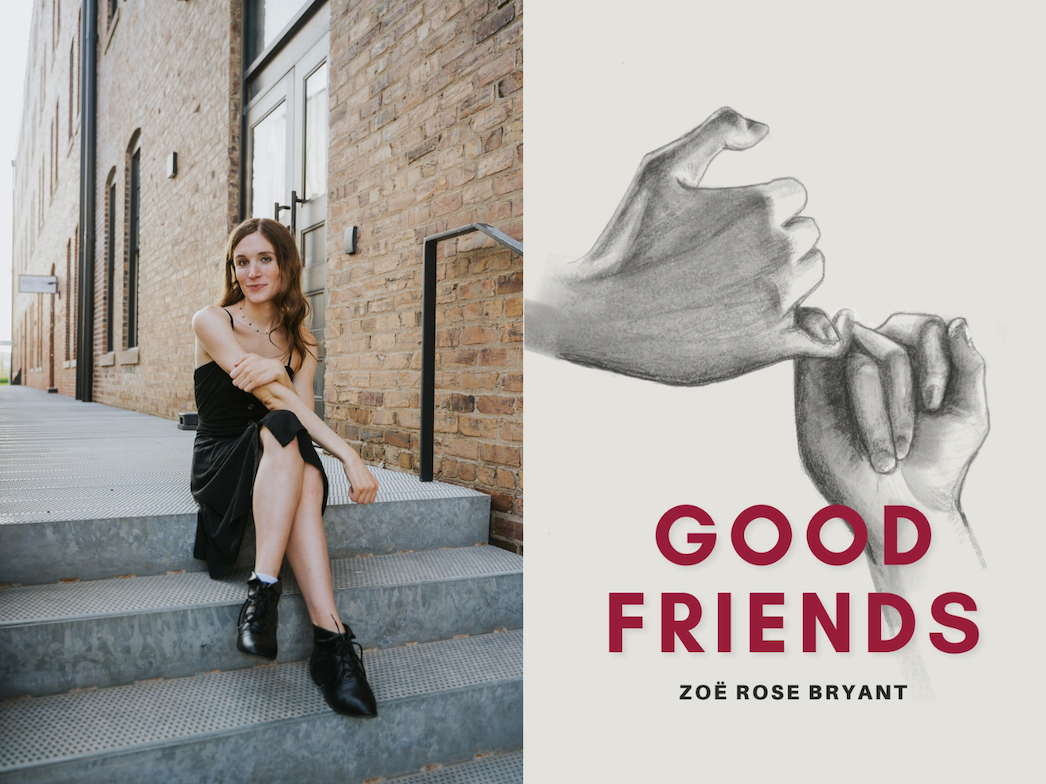
After coming out as trans in 2022, Zoë Rose Bryant quickly built a platform for herself, becoming one of the most popular and influential queer film critics on social media. Now, with the release of her debut novel Good Friends, Bryant is ready to “let people into” what she describes as a “private reconciliation” of herself over the years.
Citing film references like Richard Linklater’s Boyhood and Lukas Dhont’s Close, Bryant divided the book’s narrative into five acts. The queer coming-of-age tale follows the decades-spanning relationship between Andy and Owen, two friends who drift in and out of each other’s lives in their Nebraska small town. Owen’s outgoing nature brings Andy, the secluded protagonist, closer to reckoning with their own identity and sexuality.
Bryant originally envisioned and wrote Good Friends as a screenplay while living in Los Angeles and working as a film critic for sites like Next Best Picture, but she “realized pretty quickly” that in order to tell this story with proper prose, a novel was the go-to medium. “That was really scary to me because it’s just so much more time-consuming, I’d never done it before,” Bryant says.
The journey to writing the book and choosing to self-publish intertwined with Bryant’s own personal life and relationship to self, as she moved from Los Angeles back to her Nebraska hometown in 2024. “I came from L.A., really burnt out and stressed, and needing a break,” Bryant says. “I’d had my heart broken, and I lost my job. There was a lot of stuff that had happened where I was like, ‘I just need to reconnect with the world.’”
On Twitter, Bryant has been vocal throughout these transitional periods, sharing updates to her over 120,000 followers about raising money for surgery and the “intimidating” two-year process of writing a book. Now, just days after its release on Friday, Feb. 13, Bryant’s novel has reached the top spot on Amazon’s “Hot New Releases” list for LGBTQ+ romance stories.
The day before Good Friend’s release, The Blade had the opportunity to chat with Bryant in an exclusive interview about her major inspirations, how writing the book intertwined with her own journey as a growing public figure on social media, and the importance of celebrating the “little wins” through connecting with — and inspiring — young trans people. This interview has been edited and condensed.
Congratulations on Good Friends! How did you arrive at this specific story for your debut novel?
I think it was a year and a half into my transition, and I was just really interested in telling a coming-of-age story where we follow a character from a young age with those [out-of-body] feelings being present — even if you don’t know what to do with them. In part, it was inspired by me having come out to lifelong friends I’ve had and family, and a lot of people who felt like they knew me so well, being kind of taken aback. It was such a private reconciliation of myself; I wanted to write something that let people into that part of my understanding of myself over the years. Stuff that I never shared, never talked about, but was always there and growing in me. I’ve just never seen a story like that.
You know, there are stories about queer characters and trans characters, but not really one where you grow with that character. They’re born a boy, they’re moving through the world as a boy, but they have these feelings inside, and you get to see them blossom into who they were always born to be.
The book is also set against the political backdrop of both Obama and Trump’s presidencies.
It’s not an out-and-out autobiography by any means, but I feel like I was figuring out a lot about myself, both my sexuality and gender identity, during the height of the first Trump presidency. It was a really interesting time to come of age because there was so much progress with Obama’s presidency and the legalization of gay marriage, and all these really momentous wins for the left. Then all of that came to a halt. That definitely pumped the brakes a little bit on further interrogating my identity. I was really interested in writing a character reconciling with their queerness under the weight of all that, kind of like a period piece. It’s crazy to call the mid-2010s period, but that’s the time I knew growing up!
While writing Good Friends, I also realized how many parallels there were to Trump 2.0. I wrote and finished the first draft of the book before Kamala Harris was even the 2024 nominee. So much has changed since, but I also feel like everything that’s happened kind of strengthens the story. We have been through this before. There are people who have struggled under the weight of an administration like this, even if it’s kind of considerably worse this time. If anything, for me, it’s [about finding] a beacon of hope and finding love and support in little pockets, no matter where you live. No matter what else is going on in the world, be strong in yourself and continue on that journey, no matter how hard other people try to stop you.
You’ve built a big community online with your Twitter following and people looking to you for your thoughts on film and culture. How have you used social media as a tool to find that community, and also invite people into your creative process as a writer?
I’m so old, I’ve been on Twitter for so long! But I was personally in the film space from when I started college in 2017 to the start of 2020. Then I broke into writing about and reviewing films. In 2021, I moved to L.A. and started writing for Next Best Picture. I built up this little community of appreciating art and loving film and TV. And then I came out in February 2022! I wasn’t nearly as big online as I am right now, but I had a sizable following. It was kind of hard and weird at first because it was the main platform where I had to be like, “Hey, I’m making this huge change.” From then on, my following steadily grew. There were so few big trans voices, especially in journalism-adjacent spaces. I was always just like, “I want to use this platform for good in any way I can.” I didn’t really grow up around any trans people; I wasn’t following any trans people. This is part of the book, but in high school, the first big thing that made me realize trans people [existed] was Caitlyn Jenner coming out, and that whole saga.
I care about being really open. I’m not gatekeeping any information about these experiences because everything else is so hard — why make it harder for people to understand themselves and what’s going on with the community? So I would share all my little developments and wins, like when I changed my name, and celebrating each trans-versary, and obviously everything with my surgery.
Then, when I started writing Good Friends, I’d already amassed more of a following based on my longer-form writing. I had written a couple of really personal pieces for Kenzie Vanunu’s site Offscreen Central in 2023; one really big one was a trans reading of Poor Things. I had an influx of followers from that, and people who really appreciated the vulnerability. I just kept leaning more and more into that and wanted people to be involved. And everyone would always ask if I was working on anything more. I would write essays on Letterboxd, and people would say they’d read a book.
What has your relationship been to the trans community since coming out and embracing your vulnerability in online spaces?
I get messages all the time from younger trans people or younger queer people who have felt seen in my writing or just my journey online. Even a lot of kids who aren’t out or can’t be out where they live right now, they get hope from things that I’m writing or sharing. Every little message like that motivates me more to include other people online, whether they’re strangers or not. And through both my journeys as a person and writer, it’s really hard to feel like you’re doing anything productive for good under this administration. And for me, those little messages and little wins are like, “OK, I’m doing what I can, even if it’s small.”
I’m curious to hear more about your time in L.A., connecting with the queer community there, and how being closer to the film industry has shaped or informed your writing.
I had moved after I graduated from college in May 2021, and I started transitioning the year after. I lived in a house with some of my best friends, so I was very supported. It had been a journey. Now, both my parents are incredibly supportive; they’re my biggest cheerleaders, but it was a journey at the start. It helps a lot being in a world that was just so unlike [Nebraska]. You got some more liberal views in the late 2010s, but it was still fairly majority red, and that kind of pushed me further into the closet and away from, as I said earlier, interrogating that part of my identity. In L.A., I felt like that weight was immediately off — I could explore and be messy! That first year of transition is weird and embarrassing. You’re figuring out your style, trying makeup for the first time, and getting really shitty haircuts. I just felt that freedom to fail, fuck around, and really figure it out. Because I was allowed to blossom into who I am, when I did have to move back home to Nebraska, I just felt like fully me.
I wouldn’t have been able to write the book if I hadn’t gone on that journey, meeting people whom I would never run into in Nebraska, being in queer spaces with other queer artists. I met other trans writers who had similar experiences of where we came from, and what we want to do. I could talk to them about these feelings I’ve had forever that nobody else gets. All of a sudden, I’m looking into a mirror.
I’m so proud of you and so happy to hear about your transformative time in L.A. I know you just had your surgery too. Congratulations on everything!
Thank you! Yeah, no, it gets crazy. It’s really wild. I’m about to celebrate my fourth transversary in a week. This has been the craziest year, like holy shit! So much change. It’s crazy how much changes in such a short amount of time. This is what I’ve wanted forever.
Lastly, how does it feel to share this book with the world after everything that went into it — both creatively, and the personal events and triumphs that led you to this moment?
It’s very emotional. I was talking to my mom, and I was like, “I feel like a mom sending her child off to the first day of school.” It’s interesting because for the longest time, it lived in my head as this idea, and it was just the two of us. I gradually let more people in and would have people read and give me notes on early drafts. It’s kind of scary because even though it’s not like an out-and-out autobiography, there are a lot of personal feelings and experiences in it. Releasing that to anybody at any time is very overwhelming, and that’s been hitting me lately. But once that subsides, there’s a lot of excitement because I know the way my vulnerable writing has affected and impacted people in the past. That’s really what I hope for with the book, too.
Reviews
“The June Jordan Experience” captures the late queer poet’s tender, revolutionary legacy
The new show, playing until Mar. 29 at the Fountain Theatre, journeys through the late queer poet’s life, radical art and activism.
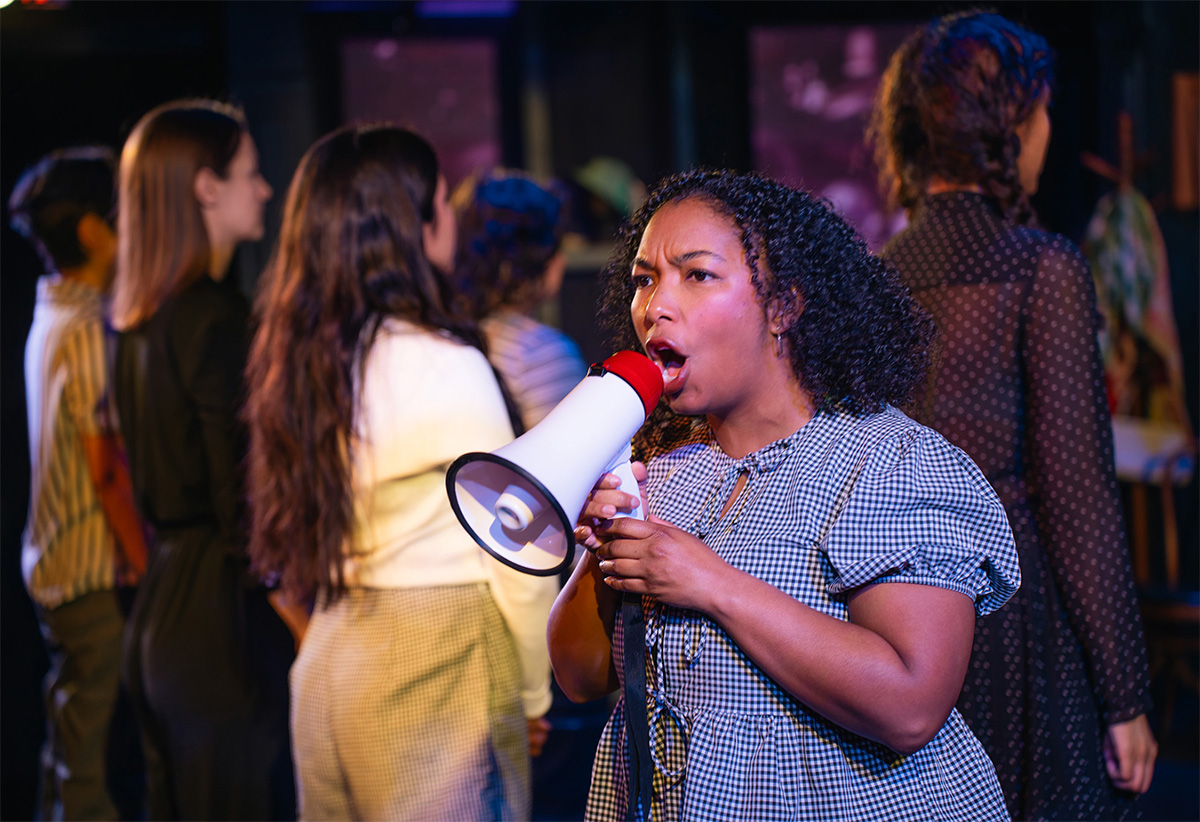
On a recent Sunday afternoon, the Fountain Theatre is nestled in quiet, minutes before a new show is to begin. Quiet jazz bounces out from the cozy cafe upstairs, and people begin to take their seats by the intimate stage inside. As the lights dim, six actors — American Covarrubias, Naseem Etemad, Kita Grayson, Mackenzie Mondag, Savannah Schoenecker, and Janet Song — begin with a powerful proclamation about the sacred act of discovering one’s own poetic voice and understanding the medium’s inherently political, participatory, and revolutionary nature.
What is stunning and clear from this very first declaration is each actor’s voice and presence: clear, loud and unwavering. Their eyes are fixed onto the crowd, flitting from person to person, demanding close attention to the production’s nearly two-hour arc that details the life and work of revered Black queer poet and activist, June Jordan.
“Poetry for the People: The June Jordan Experience” never wastes a minute. First, audience members are taken back to Jordan’s childhood in Harlem and Brooklyn, and actor Kita Grayson shapeshifts into Granville Ivanhoe Jordan — the patriarch of the family — making her body hard and rigid, her biting words twinged with Granville’s Jamaican accent. We see a young Jordan develop a penchant for poetry as a young child in the early 1940’s: a love for literature and expression blooming under the intense and even abusive watch of her father, who was her “hero and tyrant.”
We watch as each actor takes turns metamorphosing into the poet throughout the production, slipping with ease into a different part of Jordan’s life as she became a poet for the masses and a passionate educator and defender of civil rights for Black people, immigrants, Palestinian civilians, and LGBTQ+ community members. The production blends song and dance with interviews and clips of Jordan. It is refreshing to be able to see her speak: to be able to see and hear her, too, in this retrospective tribute to her life.
Throughout the show, viewers see the way Jordan’s work, alive and alchemic, traveled across mediums: not only in the defiant, romantic, and immortal texts of her poetry but also in songs, in plays, in essays, and in speeches.
Her wide-reaching impact is felt personally in this production, as her longtime partner and creative collaborator, composer Adrienne Torf, stitched together the production’s musical elements and plays the piano throughout the dynamic show. In moments, she watches the actors with steady, deferential eyes as her hands glide across the keys in gentle melodies. Love is deeply embedded in this production: Jordan’s deep devotion to creating paths of justice and humanity for others resounds throughout the show, and the love that others continue to hold for her is alive and palpable as well.
“[June] was propelled in her writing, activism and daily life to seek the possibilities for love and justice for all people,” Torf said in a recent interview. “If something was done to her or to someone she cared about, she responded with appropriate and sometimes withering anger, as would most any person with a conscience. And she cared about people in other parts of the world as much as she cared about people close to her, especially her students. June had an infectious laugh that regularly had people holding their sides as they laughed along with her. All of this comes through in her writing and the videos of her that are included in the show.”
For director and co-devisor Raymond O. Caldwell, Jordan provided him a guiding light for the development of his own activism and politically-motivated art when he was younger. “I, for so long, felt like an outsider — and then I started reading June,” Caldwell said, in an interview on KPFK. “She started teaching me what the real center of my activism was…and it’s love. Love at the center of our activism [and] art is not only art. It is personal. It is political. It is everything.”
“Poetry for the People: The June Jordan Experience” not only centers Jordan’s love and her poetic resistance — it invites the audience to take part. The actors hand out notepads and pens, and pause for a few moments throughout the show to pose writing prompts. People are encouraged to write what comes to mind, and to think about ways they can begin to seek collective and individual liberation through writing, reflecting, and community-building.
The show, experimental in its structure, is a container for possibility. It’s a timely look at how queer and marginalized people can carry June Jordan’s legacy of radical love deeply within them, as they search for tools to disrupt and dismantle the brutality that surrounds them. Jordan’s love was searing and unique in its devotion to tenderness. Her words from “Poem for Haruko” echo in my heart. “How easily you held / my hand / beside the low tide / of the world.”
“Poetry for the People: The June Jordan Experience” plays now until March 29 at the Fountain Theatre. Its next show is Monday, Feb. 16 at 8 p.m. The organization has introduced a “living ticket” model, where visitors are invited to name their own price for the show. More information can be found here.
Kristie Song is a California Local News Fellow placed with the Los Angeles Blade. The California Local News Fellowship is a state-funded initiative to support and strengthen local news reporting. Learn more about it at fellowships.journalism.berkeley.edu/cafellows.
a&e features
From ‘So Random’ to sexy theater: LA’s very own Mathew Scott Montgomery
This former Disney star breaks down their new play, ‘Foursome,’ and the security of performance.
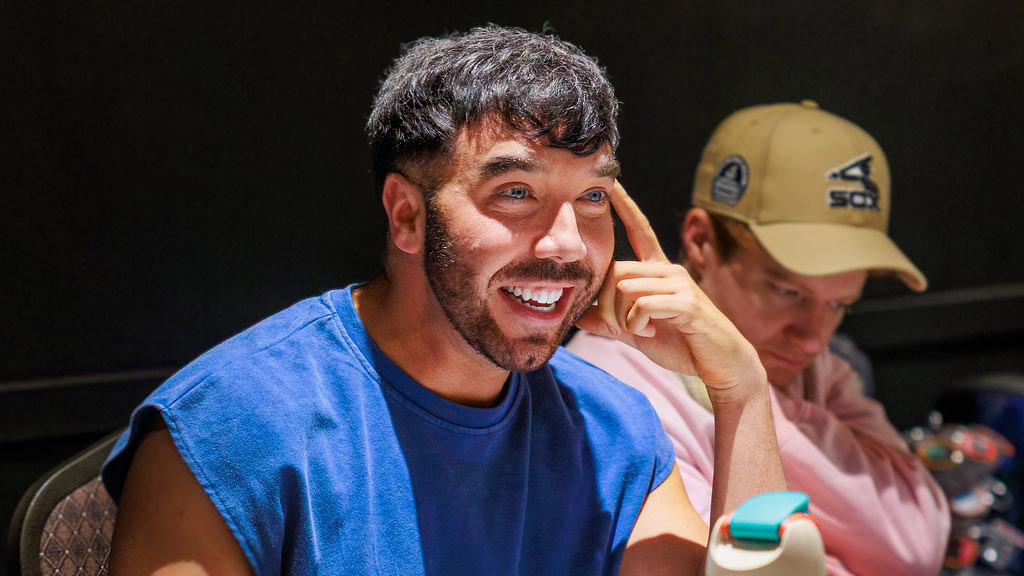
Even in a Los Angeles filled with experimental theater, few projects have been as brazenly sexual as the IAMA and Celebration’s Foursome. Following a quartet of queer friends as they embark on a weekend getaway, this play watches as they uncover the secrets (and attractions) that have always lurked in the shadows of their longtime friendships. Filled with niche community references, heartfelt vulnerability, and some of the spiciest live sex scenes audiences will ever see, Foursome is proving itself as an innovative look into queer sexuality — and none of it would have been possible without The Disney Channel.
Matthew Scott Montgomery began his career on Disney with one goal: pull focus. He quickly found out that he was a tad too good at this; in his conversation with the LA Blade, he detailed the many times his early onscreen performances were cut down because he was considered ‘too distracting.’ From starring as an extra in Zendaya’s Shake It Up to leading the SNL-style So Random!, his childhood career saw Montgomery flexing the bombastic personality he still carries today. And while the goal of this interview was to speak with the performer about Foursome and his time with Disney, the first few minutes were spent discussing an equally important portion of the man’s life: the Hilary Duff concert he’d seen at The Wiltern the night before.
“[I’d] spent all day in rehearsals with three of the best queer actors in the world, and [then I left] to go to a Hilary Duff concert in LA with my boyfriend, as a gift from [Demi Lovato],” raved Matthew. “I burst into tears because it hit me: none of this would’ve happened if I hadn’t come out…I wish I could go back to ten-year-old me back in North Carolina and [tell him], ‘One day, you’re going to leave your gay play rehearsal, [meet up] with your boyfriend, and go to a Hilary Duff concert. And everything is going to be okay.”
Matthew remembered this little kid from a conservative hometown who dreamt of nothing more than boyfriends and Lizzie Maguire in concert. He explained that his area of North Carolina didn’t allow for any level of dramatics from young boys — something that definitely didn’t mesh with this gay child who felt safest when he was onstage.
“When I was a kid, I used to record episodes of Will and Grace [on the VCR], write down the dialogue, then go into my room and run the scenes [when everyone was asleep]…I’ve always identified as an artist, and I was desperate to perform,” said Matthew, reminiscing on his early days as an artist. “I think the safest place in the world is on stage or in front of a camera, because you know exactly what you’re going to say. You know what your lines are, which mark you’re gonna hit…everyone is watching you, and you’re being perceived, and it feels so safe. I get nervous off camera, because then you don’t have a map of what’s happening.”
Performance has always served as both a passion and a safety for the actor, with Montgomery laughing at the many years he spent acting out his favorite shows in the sanctity of his childhood bedroom. Luckily, he eventually took these skills to a giant stage most kids could only dream of: The Disney Channel.
After years of hearing the terrible experiences of so many child actors, it’s heartening to learn how validating Montgomery’s early time on TV was. He told stories of Disney gigs and fun hangouts with queer stars like Haley Kiyoko and Demi Lovato, people who he still considers close friends today. “We would talk about our queerness and how to navigate it,” he said, showing love to the tight-knit network that these closeted children created for one another. It was because of their support that he had the courage to come out in his early 20s, with this new self-acceptance allowing Matthew to take on openly queer projects and even begin writing his own — cue Foursome, his latest creation and certainly the sexiest one yet.
Foursome sees the actor as Noah, a young man whose weekend at a cabin with three friends turns into a night of revelry as loosened inhibitions lead to shocking confessions. On why he created a project centered on modern sexuality, he explained, “I think there’s a really beautiful thing about the queer community where we can love each other through different evolutions of our friendships…this play is really about celebrating that freeness, and having a very frank discussion about what it means to be a queer person in a relationship in the modern day.”
The project douses this exploration into contemporary sexuality with so much pop symbolism that it’ll be relatable for any LGBTQ+ person watching. From the pop songs our main cast sing to the community-based slang they throw at one another, the writer wanted to instantly clue queer watchers into the fact that this was made for them by one of their own. And it’s that, he stressed, that is the goal of not only Foursome, but his entire career: making other people feel seen.
“What’s most important to me is queer joy,” Matthew stated, as the conversation came to an end. “Showing queer people having a good time…I think that can be a radical thing, especially with the way the world is right now. We’re going to be gay, and we’re going to be fun, and [our goal] is to have you join us in that fun.” He promises that Foursome will be a summation of his decades-long career of making people laugh, combining his uniquely gut-busting brand of humor with an earnest discussion around how our communities form relationships outside of heteronormative ideals. He invites everyone to come see Foursome and, in its nonstop joy, hopes that by creating this kind of inclusive art piece for viewers, he’ll be imparting onto them some of the security he’s always felt onstage.
And when asked if he had any final enticements for potential watchers, Montgomery adorned the smile that he’s worn since his Disney days and stated, “Well, we do say that the title, Foursome, is a promise — and we absolutely deliver.”
Foursome will have its world premiere with IAMA Theatre Company, produced in association with Celebration Theatre. Performances are at the Atwater Village Theatre, 3269 Casitas Avenue, Los Angeles, and plays now through March 23. Tickets ($30-$45) are available at iamatheatre.com
Theater
‘Incitation to the Dance’ asks what happens to love when a younger man cuts in
This dark, sexy comedy, premiering at Theatre West, looks at lust and aging in gay romance.
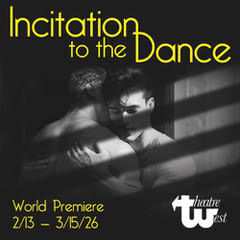
“It takes two to tango. What happens when a third cuts in?” That’s the provocative tagline of the latest dark comedy from writer/director Michael Van Duzer, Incitation to the Dance, running at Theatre West from Feb 13 to Mar 15.
The play follows an older gay couple – Malcolm is a disabled film historian who teaches a course on queer representation in film noir, while his partner Asher is a depressed and out-of-work dance instructor.
Their relationship is thrown off course when Finn, a younger dancer, stripper, and escort, crashes into their lives, exposing desires, regrets, and jealousies that had long been buried.
Van Duzer, as an older gay man with a disability himself, says he was inspired to write the show because of the relative lack of stories about older gay couples on stage and screen. Incitation provided an opportunity to explore the unique circumstances and challenges facing older queer couples.
“The fact that it’s gay men makes it somewhat different. Because of their age, getting actually legally married was not something that was available to them at the beginning of their actual relationship. Malcolm had been married to a woman at one point,” Van Duzer says.
Age and sex play out across multiple dimensions of the drama, with Malcolm jealous of the bond Asher and Finn share over dance, while Asher resents Finn’s status as an up-and-comer while he’s at the twilight of his career.
“They have several layers of rivalry that they explore throughout the play,” Van Duzer says. “They do dance with each other in these stylized dance sequences, eventually dancing out their fury.”
Van Duzer says his play’s use of heightened language and highly stylized dance sequences will intrigue audiences.
“The second dance is a tango Apache, which is a style that was done in the 20s and 30s that came from France and included slapping, hair-pulling, dragging people around, and tearing their shirts open.”
The show got its start nine years ago as part of Theatre West’s writing program as a short play presented as part of the company’s “West Fest,” and Van Duzer has been developing it since.
“The response from the audience was very good, and I saw that there was more to mine in these characters now, maybe because I’m older. I don’t know, maybe because I was no longer in a relationship,” Van Duzer admits.
As he developed the show into a full-length piece, Van Duzer brought more dance elements into it, which naturally also brought to the fore the characters’ relationships to aging and disability.
“Malcolm is reticent to discuss it in any detail, but while his Cane doesn’t slow him down, it is always there. With all of the dance, with his appreciation of it, with him being on stage not dancing, there is this natural chasm that one sees, and I think that the audience will actually relate to that much more deeply than they would to a long monologue about what happened.”
For Van Duzer, who has lived with rheumatoid arthritis all his life and had eight surgeries to treat it, it was less important to tell a tale about Malcolm’s disability than to just see it represented in how it affects his relationship.
“I don’t feel it’s a part of this story to offer explanations, but to just see the difference in not only able-bodied people but people who are dancer-athletes.”
The rawness of the sexuality and dialogue in the show presented some difficulties in casting, Van Duzor says, as some actors were reluctant to take on the piece.
Longtime collaborator David Mingrino has played Asher since the show’s earliest workshops, but Van Duzor tapped stage and screen veteran Michael Gabiano to play Malcolm, and rising star Casey Alcoser as Finn.
“They all have a terrific sense of humor and a couple of them have tried out lines that I absolutely said, ‘Hey, that’s funnier than what I wrote, so let’s go with it,’” Van Duzer says.
That humor helps carry the themes of the play, which Van Duzer says is about understanding how a relationship evolves over time.
“I want audiences to have a better understanding of what happens to a relationship, what really is important in the end.
“People can be very happy as a single person. But if your choice is to be with somebody and really work on that relationship and make it a lasting ‘til-death-do-us-part relationship, I want to share with people that, with a little kindness, with a little humor, with a little attention all at the right time, you can make this thing happen and you can still be your own person pursuing your interests.”
For Theatre West, this play also makes queer history for this long-running venue. Producer Dina Morrone shares with the Blade, “I am thrilled to be a part of this production because Michael Van Duzer’s play is the very first MainStage play/production at Theatre West in its 64-year history that presents a story about an older gay couple. In mainstream theatre, it is not common to see a story with gay characters, let alone an older gay couple featured. In this day and age, it is vital that everyone is represented on our theatrical stages. We need to show that, although it is a gay story, it is a universal one, and that, in the end, we can all relate. We are all one. One love.”
Incitation to the Dance plays at Theatre West, 3333 Cahuenga Blvd, Los Angeles, Feb 13-Mar 15, Fri-Sat 8 pm, Sun 2 pm. Tickets at theatrewest.org.
-

 Mexico2 days ago
Mexico2 days agoUS Embassy in Mexico issues shelter in place order for Puerto Vallarta
-

 a&e features5 days ago
a&e features5 days agoTello Films: Celebrating 19 years of lesbian storytelling
-

 Out & About18 hours ago
Out & About18 hours agoQueer, trans AAPI joy shone at this year’s Golden Dragon Parade
-

 Features4 days ago
Features4 days agoWhat’s next for “local hero” and longtime queer ally Genevieve Morrill
-

 Health19 hours ago
Health19 hours agoWhere medicine meets dignity: Be Well Medical Group founder Isaac Berlin is here and queer to serve the community
-

 Movies3 days ago
Movies3 days agoRadical reframing highlights the ‘Wuthering’ highs and lows of a classic
-

 a&e features4 days ago
a&e features4 days agoLiveplay series ‘Gladlands’ finds hope in the unlikeliest of places
-

 a&e features3 days ago
a&e features3 days ago‘Pee-wee as Himself’ and ‘Lurker’ directors on how queer audiences have reacted to their Spirit Award-winning films
-

 Autos16 hours ago
Autos16 hours agoGoing for gold: Ford Bronco Sport vs. Toyota RAV4

